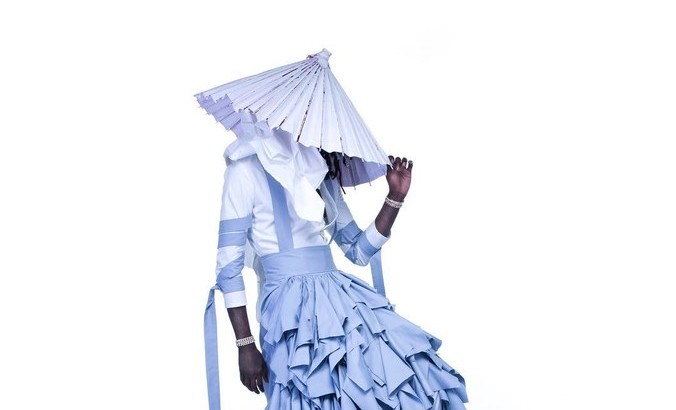Hip-hop is often stereotyped to be an unforgiving world of prejudice and narrow-mindedness when it comes to issues related to gender and sexuality. Hip-hop’s overwhelmingly destructive reputation about these issues are grounded in years of intolerance and thick walls built up, which are only beginning to crumble in recent years, one brick at a time. Much like the rest of music, hip-hop evolves with time. Both sound and subject matter develops to adapt to the word around it.
Earlier this year, Pharrell and Flying Lotus spoke about the changing nature of hip-hop. Pharrell argued that hip-hop needed to evolve to appeal to the changing times. Producers can create their own music and songs don’t have to tell stories to be influential. “There’s room for everybody now,” FlyLo said. “You can be super lyrical… you can just ride the beat barely rhymin’, and it’s all good.”
But the changing nature of hip-hop stretches much further than beats and production. The rise of artists like Syd tha Kid and Frank Ocean have jumpstarted conversations about the acceptance of homosexuality, and now we are also seeing hip-hop artists challenge the very notion of gender itself. As unlikely as it may seem to some, Young Thug is one of the most important artists in this conversation, and people are really taking notice.
On the cover of his new album, titled Jeffery – his real name – Thug wears a dress.
The baby blue ruffled skirt is designed by Alessandro Trincone, has Japanese influences, and was originally modelled on a man, not a woman. Legend has it that Thug stumbled upon the photo and immediately knew he needed the dress for the cover. “I think his cover image exactly centred my point, which is that everyone can wear whatever they want to,” Trincone told W Magazine. “Everyone can be themselves. Ignore what people are saying and thinking.”
He also explains the idea behind androgyny. “The feminine side of every male is explicitly shown through the whole collection, hoping to introduce a new meaning of masculinity, far from the traditional imagery society has carried through time.”
This is simply an example of Young Thug’s openly ambiguous style and belief system, which he claims began when he was 12. He is often seen wearing women’s clothes and has stated that he doesn’t believe in gender. In a GQ interview he said, “[I wear women’s clothes] because [they] are [slimmer] than men’s clothes. The jeans I got on right now, they’re women’s jeans. But they fit how they’re supposed to fit. Like a rock star. The only thing I probably have in men’s is, like, briefs. T-shirts. Ninety percent of my clothes are women’s.”
In itself, the fact that a guy is wearing a dress isn’t a really big deal. It’s not shocking, and it doesn’t even feel overly gimmicky – actually, it’s a beautiful image, one that you could easily imagine adorning any high-end fashion magazine. But it’s certainly worth talking about, because this is hip-hop, not fashion. Wearing a dress on his album cover continues Young Thug’s ongoing identity, going against gender stereotypes and the kind of male-dominated machismo so commonly identified with hip-hop. It also continues to force his listeners to think about the issues related to it, and that might be the most important factor of all.
That an Atlanta rapper like Young Thug has not only been labelled gender fluid, but has apparently been compared to David Bowie, Prince and Little Richard, for his approach to gender and androgyny, is remarkable for hip-hop in 2016.
To many, hip-hop artists are highly influential individuals with license to inspire and create conversations. It’s important for them to be open about who they are and inspire their fans to do the same. Thug has never been afraid of gender fluidity, again making reference to it in his Calvin Klein ad. “In my world, you can be a gangsta with a dress or you can be a gangsta with baggy pants. I feel like there’s no such thing as gender,” he said.
Ambiguity does not only live in their image, but also in their lyrics. In an interview with the UK Independent, Angel Haze spoke about their* preference for not using pronouns at all. “I like to make all my work ambiguous so that people can relate to it. If all my songs were about how in love I am with a girl… There are no key words, no pronouns,” they said.
This appeal allows Angel’s music to be interchangeable, and being open about this issue forces the listener to think about it, too. The listener can put themselves into the song’s protagonist’s shoes, applying the lyrics and emotions to their own life experiences and dreams. It might even help them express who they are and help them cope with similar struggles and issues, should they be facing them. It’s the kind of conversation that can help someone discover who they really are as a person and provide the courage to some others that person.
Could we do they if all angled toward one specific gender? No. Could we do it if gender ambiguity, non-heteronormative sexuality and other related issues were ignored or shunned? No.
As a society, we are becoming more open-minded and aware of different ways of living. We all have our own beliefs and opinions that shape who we are and allow us to grow in confidence and feel comfortable in our own skin. Hip-hop has the power to change lives for better and for worse. Yes, it still has a long way to go in some ways, but artists like Young Thug and Angel Haze deserve a lot of praise for flying these flags.
*Angel Haze prefers they/ their pronouns
Image: W Magazine

